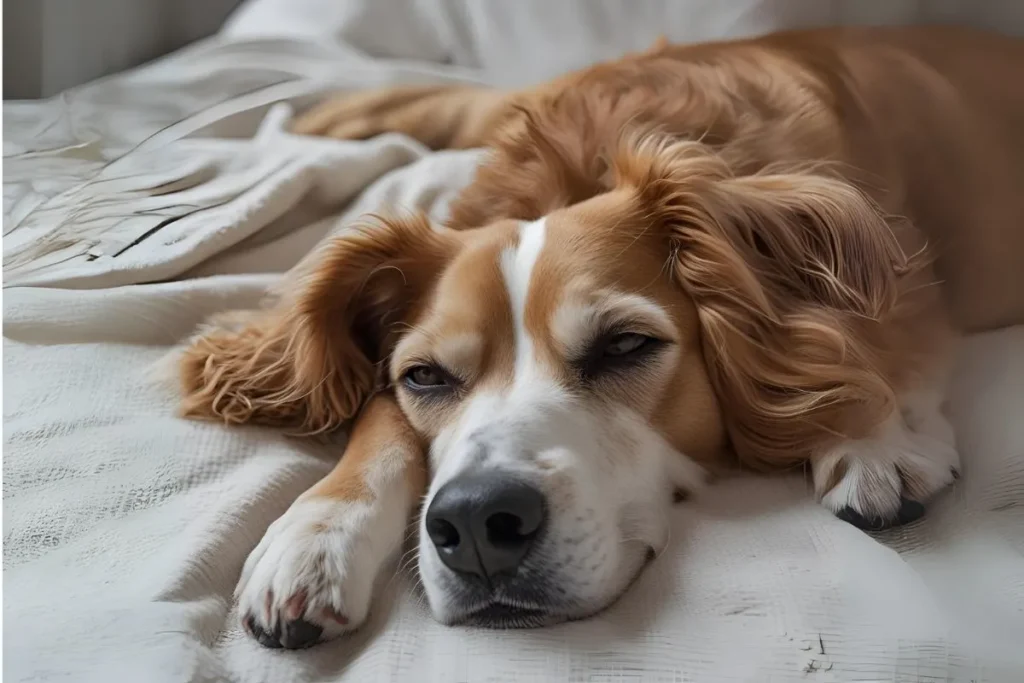Ground breaking research reveals dogs experience stress-induced sleep disruption similar to humans. Learn how negative experiences alter canine sleep architecture, with practical solutions for worried pet owners.

We’ve all endured restless nights after stressful days, but groundbreaking research reveals our canine companions suffer the same fate. A pivotal study published in the Proceedings of the Royal Society B demonstrates that dogs experience nearly identical sleep disruptions following negative experiences as humans do . This discovery transforms our understanding of canine wellbeing and reveals the profound physiological parallels between species. Hungarian researchers at the Institute of Cognitive Neuroscience and Psychology documented these effects through sophisticated EEG measurements, proving that stress doesn’t just affect dogs’ waking hours—it fundamentally alters their sleep architecture .
Decoding the Science: How Researchers Uncovered Canine Sleep Stress
The landmark study involved 16 pet dogs of various breeds undergoing controlled emotional experiences:
- Positive interactions: Play sessions, fetch, and affectionate petting
- Negative experiences: Owner separation and threatening approaches by strangers (including intense staring)
Using non-invasive EEG sensors, the team monitored brain activity during post-experience naps. This methodology allowed precise tracking of sleep stages:
- Deep sleep (NREM): Critical for physical restoration and memory consolidation
- REM sleep: Associated with dreaming and emotional processing
The results revealed dogs aren’t just “sleeping” – they’re processing daily stresses much like humans do.
Read more: Raising Girls May Be Twice as Stressful for Moms, Says UC Berkeley Research
The Stress-Sleep Paradox: Faster Sleep Onset, Poorer Quality
Contrary to human responses but equally fascinating, stressed dogs exhibited a biphasic sleep response:
- Accelerated Sleep Initiation:
Stressed dogs fell asleep twice as fast as relaxed dogs—a phenomenon termed “stress-induced quiescence.” Researchers suggest this functions as an evolutionary escape mechanism, allowing dogs to disengage rapidly from stressful environments . - Disrupted Sleep Architecture:
Despite quicker sleep onset, quality plummeted:- 20+ fewer minutes of deep NREM sleep
- Significantly prolonged REM phases
- More frequent awakenings and reduced total sleep time
Sleep Architecture Comparison
| Condition | Sleep Onset | Deep Sleep | REM Sleep | Restorative Value |
|---|---|---|---|---|
| After Positive Experience | Normal (15-20 min) | 40-50 minutes | Moderate | High |
| After Negative Experience | Rapid (<10 min) | 20-30 minutes | Extended | Low |
Why REM Surge Matters: The Emotional Processing Hypothesis
The REM increase observed in stressed dogs carries significant implications. Neuroscientists propose that REM sleep facilitates emotional processing by reactivating stress-related memories in a neurochemically safe environment (with reduced norepinephrine) . This aligns with findings that dogs deprived of deep sleep after stress show impaired learning retention—confirming sleep’s role in memory consolidation .
A 2024 follow-up study in Scientific Reports further demonstrated that dogs experiencing “positive expectancy violation” (better-than-anticipated events) showed enhanced post-sleep learning, underscoring sleep’s role in emotional memory processing .
The Personality Factor: Not All Dogs Stress Equally
Intriguingly, the study revealed individual temperament modulates stress impacts:
- Playful, outgoing dogs: Showed resilience to social stressors
- Shy/anxious dogs: Experienced more severe sleep disruption after negative events
This suggests a “one-size-fits-all” approach to canine stress management is ineffective. Age and past trauma also significantly influence vulnerability.
The Human Parallel: Shared Neurobiology of Stress
Dogs’ stress-sleep disruption mirrors human neurophysiology:
- Both species show HPA axis activation (hypothalamic-pituitary-adrenal) during stress
- Cortisol/corticosterone release disrupts sleep homeostasis
- Chronic stress creates bidirectional dysfunction: poor sleep increases stress sensitivity, creating a vicious cycle
Notably, the key difference lies in sleep onset: Humans typically struggle to fall asleep when stressed, while dogs escape into sleep—an adaptive behavior possibly rooted in their vulnerability as prey species .
Protecting Your Dog’s Sleep: Evidence-Based Interventions
- Pre-Sleep Wind-Down Rituals:
Create 45-minute calm periods before bed using gentle massage or quiet bonding. Avoid rowdy play that elevates cortisol. - Anxiety Buffering Techniques:
Use “safe haven” training where owners provide proximity security during stress. Studies show owner presence lowers heart rate during threatening events . - REM-Promoting Environments:
Maintain cool (18-21°C), dark sleeping areas. Weighted blankets may reduce night-startling—an emerging research area. - Differential Daytime Training:
Opt for reward-based (“permissive”) training over aversive (“controlling”) methods. Dogs show 26% better post-sleep memory after positive training . - Routine Veterinary Assessment:
Since poor sleep predicts emerging health issues, track changes in sleep patterns. Senior dogs need biannual check-ups as age accelerates sleep degradation.
Beyond the Lab: Real-World Implications
The Hungarian findings explain common owner observations:
- Why dogs sleep restlessly after vet visits or thunderstorms
- How rehoming trauma manifests in disordered sleep
- Why some working dogs (e.g., K9 units) need specialized recovery protocols
Ongoing research examines whether:
- Melatonin supplements aid stressed canines
- Service dogs experience cumulative sleep debt
- Puppy sleep interventions reduce adult anxiety
Honoring Our Shared Vulnerability
This research illuminates a profound truth: Dogs don’t just share our homes—they share our physiological stresses. Their accelerated sleep onset after stress reveals an adaptive survival tactic, while their diminished deep sleep mirrors our own troubled nights. By recognizing these parallels, we grow beyond anthropomorphism into evidence-based empathy.
As lead researcher Dr. Anna Kis noted: “Dogs may have a similar problem to humans after a difficult day” . Protecting their sleep isn’t mere pampering—it’s acknowledging that centuries of coexistence have woven our biological rhythms together. When we soothe their stress, we honor the silent contract written through 40,000 years of shared evolution.
References
- Kis et al. (2017). Sleep macrostructure modulated by social experiences. Proceedings of the Royal Society B.
- Topál Laboratory Findings (2024). Emotion-learning interplay in dogs. Scientific Reports.
- HPA Axis Review (2020). Sleep-stress bidirectional pathways. PMC.
- Adaptive Sleep Functions (2022). Vulnerability mitigation strategies. Evolutionary Psychological Science.
- Stress-Induced Quiescence Studies (2017-2024). Comparative species analysis.










1 thought on “Dogs’ Sleep Quality Impacted by Daily Stress, Research Shows”